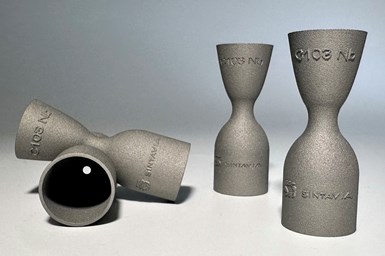Sintavia Receives Strategic Investment from Lockheed Martin
The equity investment will support continued development of Sintavia’s proprietary thermodynamic designs and components.
Sintavia’s C103 is a high-performance niobium alloy which is well suited for rocket, jet and satellite propulsion applications. Photo Credit: Sintavia
Sintavia, an additive designer and manufacturer of advanced thermodynamic components for aerospace and defense applications, has received a direct equity investment from Lockheed Martin Corp. Sintavia’s products include some of the most advanced mechanical systems used in flight applications today, including multicircuit heat exchangers, complex thermodynamic chassis and monolithic cooling pumps. The terms of the investment, which was completed on June 27, 2023, were not disclosed.
Sintavia and Lockheed Martin have a longstanding collaboration to expand the research of metal additive manufacturing (AM) opportunities as an alternative to traditional design and manufacturing methods. In December 2022, the companies announced a strategic partnership to explore additional AM technology areas in connection with the White House initiative “AM Forward,” launched by President Joe Biden in May 2022. AM Forward is a voluntary compact aimed at strengthening U.S. supply chains by supporting U.S.-based suppliers’ adoption and deployment of AM.
Since 2019, Sintavia has been a component supplier to Lockheed Martin and currently maintains supply relationships across all four Lockheed Martin business areas. Components supplied by Sintavia support a number of key Lockheed Martin programs, including the F-35 and F-22. Proceeds from the investment will be used to continue to fund additional development and testing at Sintavia.
“This investment not only cements the relationship between Lockheed Martin and Sintavia but also demonstrates the fact that Sintavia’s thermodynamic components — optimized through additive technology — are sought after by the largest and most substantial prime integrators within the aerospace and defense industry,” says Brian Neff, Sintavia’s founder and CEO. “Lockheed Martin represents the very best of these, and we are honored to have their backing as we continue to grow and expand our product line.”
Lockheed Martin’s strategic investment expands the existing joint development agreement with Sintavia announced last December. “We look forward to strengthening our collaboration on the design and supply of additively manufactured parts across the defense industrial base,” says David Tatro, vice president for Operations Process Transformation at Lockheed Martin.
- Read about the Lockheed Martin and Sintavia partnership to advance metal additive manufacturing. The collaboration is said to demonstrate Lockheed Martin’s commitment to the White House’s AM Forward initiative for expanding use of additive manufacturing and creating resilient supply chains.
- Lean about Sintavia developing an additive manufacturing facility for the U.S. Navy. Sintavia is collaborating with Bechtel Plant Machinery to develop a dedicated additive manufacturing facility in support of the U.S. Naval Nuclear Propulsion Program.
- Here’s information about Sintavia’s development of niobium printing technology for aerospace, defense. The C103 material parameter specification is said to enable full alloy adoption across defense and space applications.
Related Content
-
What Is Neighborhood 91?
With its first building completely occupied, the N91 campus is on its way to becoming an end-to-end ecosystem for production additive manufacturing. Updates from the Pittsburgh initiative.
-
The Cold Spray Solution to the Casting, Forging Supply Chains
Startup HAMR Industries performs additive manufacturing work at Neighborhood 91 that provides an alternative to traditional casting and forging. Success so far has led to redefining the limits of its additive equipment.
-
Do Distributors Dream of Digital Inventory? Würth Additive Group Does
It’s more than a dream for Würth Additive Group and its parent company, in fact. Along with supplying additive equipment, the group is now developing solutions for sourcing 3D printed parts in a reliable, elastic digital inventory model.















